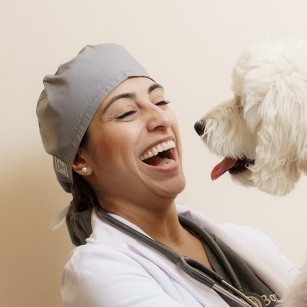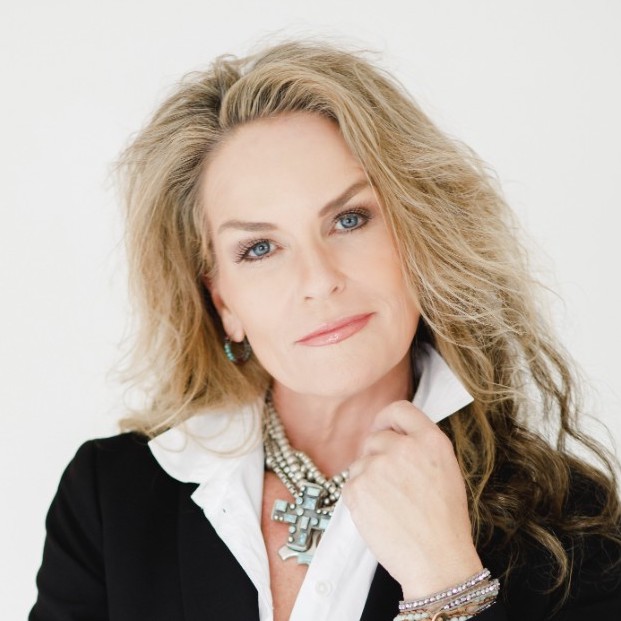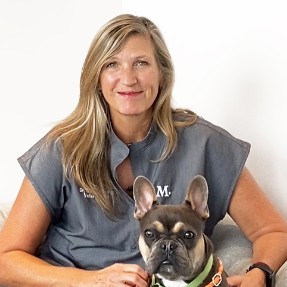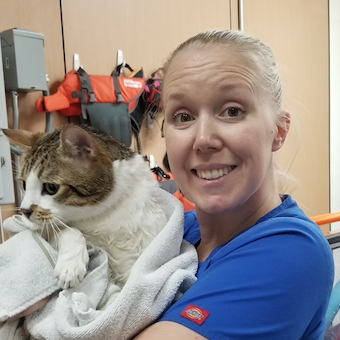Let us set the scene.
Fluorescent bulbs buzzing and flickering. A dog licking mud (is that mud?) off the peeling linoleum lobby floor. Phones ringing off the hook with no end in sight. A spilling wall of paper charts. Uncomfortable plastic chairs from the 90s. Cold, scientific, spooky exam rooms. IV pumps screeching. A stale box of Walmart cupcakes in the repurposed closet-turned-breakroom.
This isn’t a scene in a horror movie, it’s an outdated veterinary practice.
The people of vet med (and pet owners) expect and deserve more from the experience we provide in our practices.
The “SEE-cret” Sauce for Building Better Experience in Vet Med
1. Success: Can I do [the thing]?
This is the foundation of experience.
Can clients successfully access care for their pets? Can your teams successfully do their work?
Successfully being able to do anything is the foundation of any experience. We must start all experiences from a place of success.
2. Ease: How easy is it to do [the thing]?
“As an industry, taking the approach of proactivity vs. reactivity will lead to a more sustainable future. As the industry changes, I hope to see organizations focus on shifting and reshaping the classic veterinary model,” says Zay, CVO of Bond Vet.
We must be proactive with how we approach our culture, our client relations, and our practice of medicine.
Is something not working? Maybe something is a bit challenging? How do we alleviate that struggle before it becomes a larger problem in the practice and beyond?
Veterinary medicine as a whole isn’t easy, but we should look to remove friction and bring ease into veterinary medicine every chance we get.
3. Emotion: How does doing [the thing] make me feel?
Emotion - how you feel - has an exponential effect on experience.
Frustration. Disgust. Annoyance. Felt bad reading those, huh?
Now read these.
Delight. Joy. Surprise. That’s what we’re talking about 😎
“As we all know, employment standards across the veterinary industry have been long overdue for a massive review and updating,” Nicole McLeod, Head of Talent Acquisition at Small Door remarks. “Veterinary employment is [often] characterized by unfair and inequitable compensation, punitive non-competes that restrict professional advancement opportunities, insufficient healthcare coverage or complete absence of it, suboptimal parental leave and similarly, no consideration to family planning - which, for an industry that skews heavily female, is unacceptable.”
Did that leave you with a positive emotion? Didn’t think so.
We’ve got some work to do.
And the first thing we should work on? The experience of the people of vet med.
Want to explore more practical tips?
Check out the section on engagement & experience in The Ultimate Guide for Awesome Culture in Veterinary Medicine.
Want to share some of your favorite practical tips?
Collaborate on an article with us! (Email sara@hound.vet for details.)
From The Experts
From Zay Satchu, CVO @ Bond Vet:
"As an industry, taking the approach of proactivity vs reactivity will lead to a more sustainable future. As the industry changes, I hope to see organizations focus on shifting and reshaping the classic veterinary model.
It’s great to see different groups push forward and approach work environments from a team-first perspective. I firmly believe this is truly the only way to guarantee a successful future in veterinary medicine."
From Audrey Wystrach, CEO @ Petfolk:
"The change is now and Petfolk is building the practice model of the future. As a veterinarian, I have a deep commitment to providing best-in-class medical care and creating incredible value for our care teams and customers. I am a champion of innovation and creative workflows to improve efficiencies and empower teams to provide exceptional and memorable customer experiences.
As we build for the future we must keep people, care teams & pet parents, at the forefront, and commit to helping people understand and feel empowered. I believe in surrounding the customer and medical teams with tech and data to provide improved health outcomes, increased contact time with pet parents, and delivery of radically different veterinary experiences.
We can utilize technology to optimize processes and procedures, reduce redundancies, and find efficiencies. At Petfolk we believe an integrated practice model with virtual care at the core allows us to meet the customer where they want to be met, in-person, virtual, or on the fly. The modern consumer demands these choices and ultimately this connected care model will enhance the lives of pets, the people that they love, and their care providers."
From Josh Guttman, CEO @ Small Door:
"As we all know, employment standards across the veterinary industry have been long overdue for a massive review and updating. Veterinary employment is characterized by unfair and inequitable compensation, punitive non-competes that restrict professional advancement opportunities, insufficient healthcare coverage or complete absence of it, suboptimal parental leave, and similarly, no consideration to family planning - which, for an industry that skews heavily female, is unacceptable. We founded Small Door with a dual mission - to provide a best-in-class standard of care for pets and to restore dignity and respect to the veterinary profession.
From the beginning, we took a stance that we would never ask doctors to sign non-competes restricting their abilities to move on from our company if they need to make a change personally or professionally. We believe our brand and our culture speak for themselves - we provide doctors with an environment and platform that empowers them to do their best work without the need to begin our relationship by placing restrictions or controls on their future.
Additionally, we offer fair parental leave, compensation & benefits, and programs that are specifically designed around mental health, which eradicates many of the typical stressors that contribute to depression and burnout. We do not set commission-related targets for our veterinarians; they are free to recommend only the treatments and services that are truly necessary, ensuring conscientious, responsible care. We do not double book appointments; we staff our nurses at a ratio of at least 2:1 to provide ample support for our veterinarians; and we schedule dedicated admin time outside of appointments to ensure our doctors never feel the need to rush their patients’ care. We also seek to remove the stigma associated with caring for one’s mental health, which is often a major block to seeking treatment, with programs focused on mental health and well-being.
Most of all, we want to support our staff in being their very best and performing at the top of their game. We’re redefining the workplace for our medical team, which also allows them to foster a community and build relationships with each other outside of work. Because of this, they can collaborate in the practice at an even higher standard for our members. We look forward to a future where veterinary medical professionals are supported and empowered to be their best, and we’re proud to pave the way for industry-wide change in the coming years that’s long overdue."
From Christie Long, Head of Veterinary Medicine @ Modern Animal:
For us at Modern Animal, when we are looking to solve a particular problem created because of entrenched industry behaviors, either by clients or clinicians, there is an active process of asking “why are things the way they are?” and then challenging ourselves to think differently. One very successful example of this is the way we structured client communications at Modern Animal. We removed traditional telephone communication as an option, and instead funnel all client interactions through our app. This results in a much more tranquil environment in our clinics, reducing noise and stress for our in-clinic teams, and our clients get great service from our virtual team over chat and video calls. And because our in-clinic teams don’t have the responsibility of fielding calls from clients, they can focus on providing great care to the patients in front of them, knowing that those that aren’t in the clinic on a given day are still being tended to by their virtual teammates.
Another example is how we handle client service issues, which we refer to as “escalations”. As a leadership team, we wanted to have a way to intercept clients who were unhappy before they went to Google and Yelp! and told the world about it, so we devised a way to use Slack to allow our team members to ask for help when they have a potentially dissatisfied client. Prior to that, we empower our team members to do what they can to deescalate the situation, but knowing that they have backup if they need it gives them confidence going into these traditionally difficult situations.
Everyone at Modern Animal, regardless of whether they are a care provider or on our support team, knows that we are here to challenge the norms of our industry. One of our company values is “set our own bar”, and we routinely talk about how we are doing this, and recognize individuals who embody it. This creates a mindset as to what is expected, and our teams really internalize this."








.gif)


